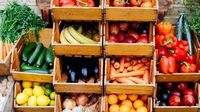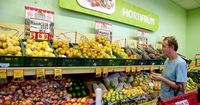The National Consumer Price Index (IPCA), which measures the official inflation in Brazil, rose by 0.43% in April 2025, according to the Brazilian Institute of Geography and Statistics (IBGE) on Friday, May 9, 2025. This figure indicates a deceleration compared to the 0.56% increase recorded in March 2025. Over the past 12 months, inflation accumulated a high of 5.53%, an increase from 5.48% observed previously. In the year, the IPCA shows a rise of 2.48%, while in April 2024, the variation was only 0.38%.
The results align closely with market expectations, which anticipated a monthly increase between 0.38% and 0.44%. The inflation last month was primarily driven by rising prices in food and health products. The Food and Beverages group had the largest impact, rising by 0.82% and contributing 0.18 percentage points to the index. Health and personal care also saw a significant increase of 1.18%, impacting the index by 0.16 percentage points.
Food prices, while still high, showed signs of slowing down compared to March. The increase in food at home was 0.83%, while food away from home rose by 0.80%. Notable increases in specific items included potatoes (18.29%), tomatoes (14.32%), ground coffee (4.48%), and snacks (1.38%). However, rice prices fell by 4.19%, highlighting some variability within the food sector.
Fernando Gonçalves, the IPCA manager, explained, "The food group carries the most weight in the IPCA, so even with a slowdown, it exerts significant impact. In April, we also observed a greater spread of positive rates within the group, with the diffusion index rising from 55% to 70%, although this involved sub-items of lesser weight." This indicates a broader range of products contributing positively to the inflation figure, even as some individual prices declined.
The Health and Personal Care sector's increase was largely influenced by pharmaceutical products, which rose by 2.32%, marking the highest individual positive impact on the overall index at 0.08 percentage points. This increase was attributed to the authorization for a price adjustment of up to 5.09% for medicines starting March 31, 2025. Additionally, personal hygiene items also contributed to this sector's growth with a 1.09% increase.
On the other hand, the Transportation group recorded a decrease of 0.38%, impacting the overall rate negatively by 0.08 percentage points. This decline was primarily due to a significant drop in airfare prices, which plummeted by 14.15%, alongside a 0.45% decrease in fuel prices. All fuel types experienced negative variation in April: diesel oil (-1.27%), vehicular gas (-0.91%), ethanol (-0.82%), and gasoline (-0.35%). Gonçalves noted that the reduction in diesel prices at refineries from April 1 and the advancement of the ethanol harvest were key contributing factors to these declines.
In the Clothing group, which saw an increase of 1.02%, the growth was driven by women's clothing (1.45%), men's clothing (1.21%), and footwear and accessories (0.60%). The seasonal change and the introduction of new collections were cited as reasons for this increase.
Personal expenses also saw a rise of 0.54%, with notable increases in cigarette prices (2.71%) and banking services (0.87%). Meanwhile, the Housing sector experienced a slowdown, with the index dropping from 0.24% in March to 0.14% in April. This was influenced by a reduction in residential electricity prices, which fell by 0.08% due to a decrease in PIS/Cofins taxes in certain regions.
In terms of regional variations, Porto Alegre recorded the highest inflation rate at 0.95%, primarily due to increases in residential electricity (3.37%) and tomato prices (45.96%). Conversely, Brasília had the lowest variation at 0.04%, attributed to declines in airfare prices (-7.46%) and gasoline (-1.69%).
The National Consumer Price Index (INPC) also reported an increase of 0.48% in April 2025, with accumulated inflation of 2.49% for the year and 5.32% over the last 12 months, surpassing the previous 5.20% recorded. This indicates that food prices within this index also saw a deceleration, falling from 1.08% in March to 0.76% in April.
As the Central Bank of Brazil continues to monitor inflation closely, it recently raised the basic interest rate (Selic) by 0.50 percentage points to 14.75% per year, signaling ongoing efforts to manage inflation and maintain economic stability. The next IPCA results, reflecting the month of May, are scheduled for release on June 10, 2025.
With the current inflation rate remaining above the Central Bank's target of 3% (with a margin of 1.5 percentage points), the economic outlook remains challenging. Analysts predict that inflation could end the year at approximately 5.53%, with the Selic rate remaining at 14.75%.






